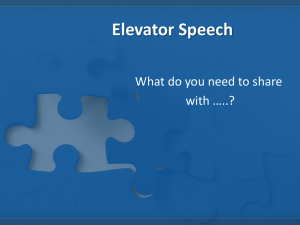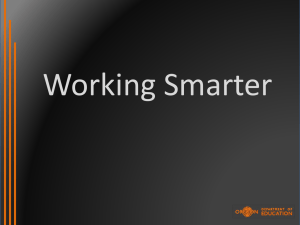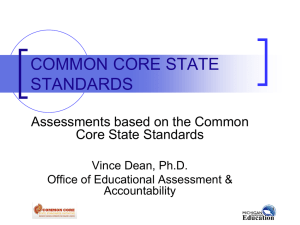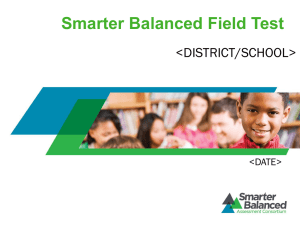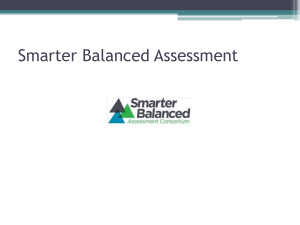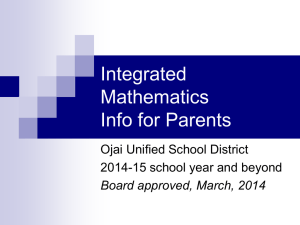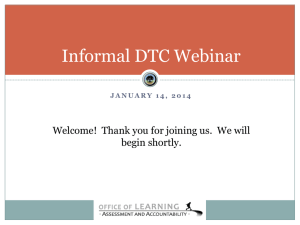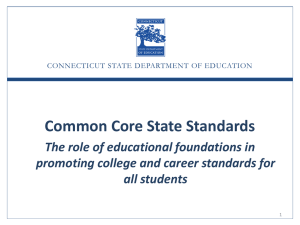Secondary Presentation - Oregon Department of Education
advertisement
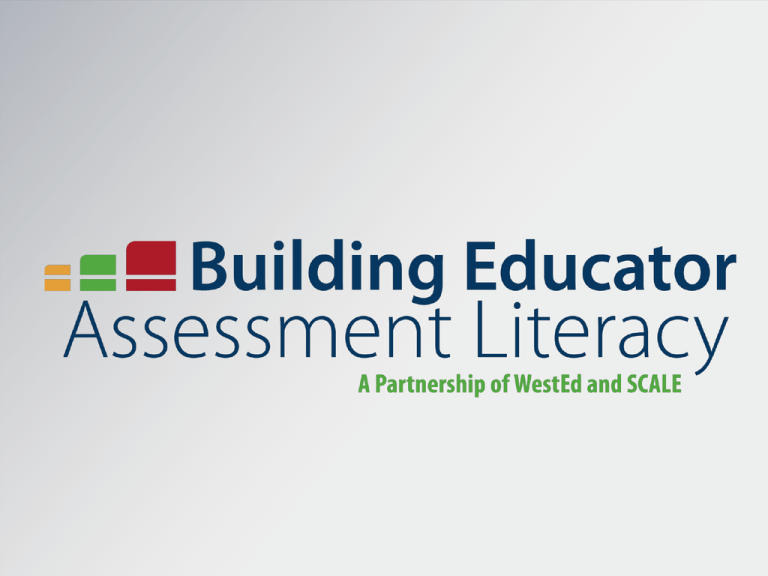
Session 1: Welcome and Introduction Session 1 Objectives • Understand purpose of the project and the training • Understand the requirements for use of secure materials • Develop foundational knowledge about the assessment continuum, the Smarter Balanced Assessment System, and Universal Design for Learning Building Educator Assessment Literacy – Introduction to the Project Purpose of This Training • Learn about Smarter Balanced performance tasks, how they assess college and career readiness, and where they fit into the assessment continuum. • Use Smarter Balanced scoring tools and processes to analyze student work and develop a deeper understanding of the Smarter Balanced performance tasks and the instructional shifts of the Common Core State Standards. • Plan for all students to learn the skills and content necessary to gain mastery on the Common Core State Standards and to demonstrate that mastery on the Smarter Balanced performance tasks. Security Considerations Smarter Balanced and the California Department of Education have generously granted access to Smarter Balanced performance task materials and student responses from the spring 2014 Field Test for the purposes of this project. • These secure materials are for use only by project participants during the course of training events. • All participants must sign a non-disclosure agreement (NDA). • Secure materials may not be used or disclosed in any other way or shared with any other individual and may not be publicly displayed, published, or announced. • Secure materials may not be retained in any form after the project training events are complete. • The copying, reproduction, or distribution of restricted-access materials (including screenshots) is strictly prohibited. Cell phones or electronic devices cannot be used during sessions that use secure materials. • In face-to-face events, printed restricted-access materials will be packaged separately, logged upon distribution, checked back in before departure each day, and securely destroyed. Note-Taking Guide Separate handout • Session titles and objectives • Topics or activities • Space to write your comments and questions Getting to Know You . . . 1. Choose one word to describe your impressions of the Smarter Balanced Assessment System. • Write your word/phrase on a sticky note (Color #1). 2. Choose one word to describe your experience implementing the Common Core State Standards. • Write your word/phrase on a sticky note (Color #2). 3. When you’ve finished your sticky notes, discuss in pairs: • What has changed in your own instruction with the transition to the new standards? Four Corners Go to the corner that you know the most about: 1. Common Core instructional shifts 2. Smarter Balanced in general 3. Smarter Balanced claims, targets, and rubrics 4. Smarter Balanced performance tasks Getting to Know You . . . Pair-Share Turn to someone in your corner and share: • Why did you pick this corner? • What do you know about this topic? The Smarter Balanced Assessment System Why Performance Tasks? READ: “Role of Smarter Balanced Performance Tasks” (Handout 1.1 in your booklet). DO: Mark 2–3 most important words and/or phrases in the handout (highlight, underline, or circle). Key Phrases • Interaction with varied, rich stimuli • Engages students in a scenario – Solve a problem – Create a product with a specific purpose • Application of knowledge and skills • Integration . . . across multiple standards • Assesses what selected- and constructed-response items cannot Reflect . . . Based on your analysis of the “Role of Smarter Balanced Performance Tasks” document, why is Smarter Balanced using performance tasks in its summative assessments? The Short Answer . . . College and Career Readiness The Role of UDL in Smarter Balanced Summative Assessments and Our Own Classroom Instruction Transition to Content Group Breakouts Session 2 Hand-Scoring Cycle I Session 2 Objectives • Experience a Smarter Balanced performance task from the perspective of a student. • Understand alignment with Smarter Balanced Claims and CCSS Standards for Mathematical Practice. • Understand and use Scoring Guides to score student responses to hand-scored items within the task. Norms for Participation • We will help to create a collegial and productive atmosphere. • We will be fully present by attending closely to the materials provided, and by being aware of behaviors that affect the engagement of others. • When working with secure materials, we will honor the trust placed in us to follow the necessary protocols. • We will keep confidential all discussions, comments and deliberations related to the secure content of this training. 21 Session 2: Hand-Scoring Cycle I Talent Show Classroom Activity Grade 6 Session 2: Hand-Scoring Cycle I Classroom Activity Discussion: • What is talent? • What are examples of talent? • What is a talent show? • What technical equipment might you need for a talent show? Session 2: Hand-Scoring Cycle I Classroom Activity Discussion (continued): What technical equipment might you need for a talent show? • Microphones • Spotlight • Disco ball • Costumes Session 2: Hand-Scoring Cycle I Classroom Activity You are now ready to complete the Talent Show performance task! Session 2: Hand-Scoring Cycle I Individually Complete Performance Task: Talent Show (20 minutes) Session 2: Hand-Scoring Cycle I Initial Reactions At your table, discuss your experience with the task. • What did you notice? • What questions arose? • What surprised you? Session 2: Hand-Scoring Cycle I Let’s Unpack This Task • • • • Identify the math and anticipate issues Understand the Smarter Balanced Claims Alignment of the task Reflect on the purpose of Smarter Balanced performance tasks Session 2: Hand-Scoring Cycle I Identifying the Mathematics and Anticipating Issues • What do students need to know and be able to do to accomplish the task? • What do you expect students to struggle with in this task? Use Handout 2.1 to make some notes. Session 2: Hand-Scoring Cycle I Aligning the Task • Which of the CCSS Standards for Mathematical Practice are engaged in this task? • Which of the Smarter Balanced Claims are assessed by this task? Session 2: Hand-Scoring Cycle I Standards for Mathematical Practice 1. Make sense of problems and persevere in solving them. 2. Reason abstractly and quantitatively. 3. Construct viable arguments and critique the reasoning of others. 4. Model with mathematics. 5. Use appropriate tools strategically. 6. Attend to precision. 7. Look for and make use of structure. 8. Look for and express regularity in repeated reasoning. Session 2: Hand-Scoring Cycle I What Constitutes a Claim? • Claims are broad statements of an assessment system’s learning outcomes. • A claim is a statement of what students know and can do, based on the evidence they produce. • Each Smarter Balanced Claim has multiple assessment targets—defined by content standards— to specify within the broader sense of the claim. Session 2: Hand-Scoring Cycle I Overall Smarter Balanced Claims Grades 3–8 Students can demonstrate progress toward college and career readiness in mathematics. Grade 11 Students can demonstrate college and career readiness in mathematics. Session 2: Hand-Scoring Cycle I Claim 1: Concepts and Procedures • Students can explain and apply mathematical concepts and carry out mathematical procedures with precision and fluency. Claim 2: Problem Solving • Students can frame and solve a range of complex problems in pure and applied mathematics. Claim 3: Communicating Reasoning • Students can clearly and precisely construct viable arguments to support their own reasoning and to critique the reasoning of others. Claim 4: Data Analysis and Modeling • Students can analyze complex, real-world scenarios and can use mathematical models to interpret and solve problems. Session 2: Hand-Scoring Cycle I Claim 1: Concepts and Procedures Claim 2: Problem Solving Claim 3: Communicating Reasoning Claim 4: Data Analysis and Modeling Evidence of Claim 1 shows that students can “do math.” Evidence of Claims 2, 3, and 4 shows that students can apply mathematics to novel situations, think and reason mathematically, and use math to analyze empirical situations, understand situations better, and improve decisions. Session 2: Hand-Scoring Cycle I Alignment Activity Use the card handouts to indicate: 1. Which of the CCSS Standards for Mathematical Practice are engaged in this task? 2. Which of the Smarter Balanced Claims are assessed by this task? Session 2: Hand-Scoring Cycle I Purpose of Performance Tasks Reflect on the purpose of Smarter Balanced performance tasks. • What is being assessed in the performance task that is different/beyond the content standards? Session 2: Hand-Scoring Cycle I Let’s look at how students handled this task. Session 2: Hand-Scoring Cycle I Overview of Session Getting to Know the Task Scoring Items Complete Classroom Activity Sort student responses to item 3 Review and discuss Scoring Guide for item 3 Score student responses to item 3 Compare and discuss scores for item 3 Repeat the steps of scoring with items 4 and 6 Complete performance task Initial reactions to the task Identify the mathematics and anticipate the issues Aligning the Task Align task to Standards for Mathematical Practice and Smarter Balanced Claims Debriefing the Task Session 2: Hand-Scoring Cycle I Analyzing Student Work Keep an eye out for: • Common errors/misconceptions • Successful approaches • Examples of good explanations Make notes as needed on Handout 2.3 Session 2: Hand-Scoring Cycle I Initial Sort: Student Responses to Item 3 Low Middle High Session 2: Hand-Scoring Cycle I Dependencies Among Items Item 1 Response Item 2 Response Item 3 Response Item 4 Response Item 5 Response Item 6 Response If the reasoning is correct on item 4, but there is a follow-through error from item 3, award full credit. Session 2: Hand-Scoring Cycle I Review and discuss Scoring Guide for item 3. Note: The response in item 3 is used in subsequent items. Session 2: Hand-Scoring Cycle I Individually score student responses to item 3. When finished, please quietly record notes on the Analyzing Student Work Handout. Session 2: Hand-Scoring Cycle I Compare scores for item 3. Discuss discrepancies. Session 2: Hand-Scoring Cycle I Overview of Session Getting to Know the Task Scoring Items Complete Classroom Activity Sort student responses to item 3 Review and discuss Scoring Guide for item 3 Score student responses to item 3 Compare and discuss scores for item 3 Repeat the steps of scoring with items 4 and 6 Complete performance task Initial reactions to the task Identify the mathematics and anticipate the issues Aligning the Task Align task to Standards for Mathematical Practice and Smarter Balanced Claims Debriefing the Task Session 2: Hand-Scoring Cycle I Review and discuss Scoring Guide for item 4. Note: The response on item 4 may depend on the response on item 3. Session 2: Hand-Scoring Cycle I Individually score student responses to item 4. Session 2: Hand-Scoring Cycle I Compare scores for item 4. Discuss discrepancies. Session 2: Hand-Scoring Cycle I Initial Sort: Student Responses to Item 6 Low Middle High Session 2: Hand-Scoring Cycle I Review and discuss Scoring Guide for item 6. Note: The response on item 6 may depend on the responses on item 3 and item 5. Session 2: Hand-Scoring Cycle I Individually score student responses to item 6. Session 2: Hand-Scoring Cycle I Compare scores for item 6. Discuss discrepancies. Session 2: Hand-Scoring Cycle I Overview of Session Getting to Know the Task Scoring Items Complete Classroom Activity Sort student responses to item 3 Review and discuss Scoring Guide for item 3 Score student responses to item 3 Compare and discuss scores for item 3 Repeat the steps of scoring with items 4 and 6 Complete performance task Initial reactions to the task Identify the mathematics and anticipate the issues Aligning the Task Align task to Standards for Mathematical Practice and Smarter Balanced Claims Debriefing the Task Session 2: Hand-Scoring Cycle I Analyzing Student Work What did you learn from analyzing responses to this task? • Common errors/misconceptions • Successful approaches • Examples of good explanations What were you unable to determine about students’ understanding and skill from the responses reviewed? Session 2: Hand-Scoring Cycle I Questions to consider over lunch: 1. What are potential barriers for special populations in handling this task? 2. If the responses you reviewed had been from your own students, where would you want to go in your own instruction? Collect Secure Materials Session 3 Instructional Implications Part I Moving from Summative Context to Curriculum-Embedded Context Objectives for Session 3 • Begin to think about the instructional implications of Smarter Balanced performance tasks. • Consider the role of Universal Design for Learning in the context of your own curriculum and instruction. Session 3: Instructional Implications Part I Reflection questions from before lunch: 1. What are potential barriers for special populations in handling this task? 2. If the responses you reviewed had been from your own students, where would you want to go in your own instruction? Session 3: Instructional Implications Part I Framing Question What kinds of learning experiences or tasks do you think students need to support their success on Smarter Balanced performance tasks? Session 3: Instructional Implications Part I Poster Activity • Review any relevant notes you took on Handouts 2.1 and 2.3 during the first hand-scoring cycle, to generate some initial ideas on your own. • Begin to collect and record any shared ideas on poster paper in your groups. • You will have opportunities to expand and refine this list throughout these two days. Session 3: Instructional Implications Part I Activity: Planning with UDL Reflect on instructional strategies that support the three UDL principles on Handout 3.1. • Which of these could be used in planning the kinds of learning experiences that you have started to identify in your group? Session 4 Hand-Scoring Cycle II Secondary Math Objectives for Session 4 • Experience a Smarter Balanced performance task from the perspective of a student. • Understand and use Scoring Guides to score student responses to hand-scored items within the task. Norms for Participation • We will help to create a collegial and productive atmosphere. • We will be fully present by attending closely to the materials provided, and by being aware of behaviors that affect the engagement of others. • When working with secure materials, we will honor the trust placed in us to follow the necessary protocols. • We will keep confidential all discussions, comments and deliberations related to the secure content of this training. 66 Session 4: Hand-Scoring Cycle II—Secondary Choose the Better Baseball Player Classroom Activity Grade 8 Session 4: Hand-Scoring Cycle II—Secondary Classroom Activity Discussion questions for how to play baseball: • Who can explain how baseball is played? • What is a run and a home run? • What is an error? • How does an error affect a team’s score? • What makes a good baseball player? Session 4: Hand-Scoring Cycle II—Secondary Session 4: Hand-Scoring Cycle II—Secondary Classroom Activity (continued) Discussion questions for attending a baseball game: • Professional teams play in stadiums. Who can describe the different seats in a stadium (bleachers, main box seats, reserve seats)? • What are single-game tickets and season tickets? Session 4: Hand-Scoring Cycle II—Secondary Session 4: Hand-Scoring Cycle II—Secondary Classroom Activity Vocabulary Baseball fan Run, homerun, error Home game, season tickets Seating sections: box, reserve, bleacher Session 4: Hand-Scoring Cycle II—Secondary Classroom Activity You are now ready to complete the performance task! Session 4: Hand-Scoring Cycle II—Secondary Individually Complete Performance Task: Choose the Better Baseball Player (20 minutes) Session 4: Hand-Scoring Cycle II—Secondary Initial Reactions At your table, discuss your experience with the task. • What did you notice? • What questions arose? • What surprised you? Session 4: Hand-Scoring Cycle II—Secondary Identifying the Mathematics and Anticipating Issues • What do students need to know and be able to do to accomplish the task? • What do you expect students to struggle with in this task? Use Handout 4.1 to make some notes. Session 4: Hand-Scoring Cycle II—Secondary Overview of Session Getting to Know the Task Scoring Items Complete Classroom Activity Sort student responses to item 4 Review and discuss Scoring Guide for item 4 Score student responses to item 4 Compare and discuss scores for item 4 Repeat the steps of scoring with item 6 Complete performance task Initial reactions to the task Identify the mathematics and anticipate the issues Debriefing the Task Session 4: Hand-Scoring Cycle II—Secondary Analyzing Student Work Keep an eye out for: • Common errors/misconceptions • Successful approaches • Examples of good explanations Make notes as needed on Handout 4.2 Session 4: Hand-Scoring Cycle II—Secondary Initial Sort: Student Responses to Item 4 Low Middle High Session 4: Hand-Scoring Cycle II—Secondary Review and discuss Scoring Guide for item 4. Session 4: Hand-Scoring Cycle II—Secondary Individually score student responses to item 4. When finished, please quietly record notes on the Analyzing Student Work Handout. Session 4: Hand-Scoring Cycle II—Secondary Compare scores for item 4. Discuss discrepancies. Session 4: Hand-Scoring Cycle II—Secondary Overview of Session Getting to Know the Task Scoring Items Complete Classroom Activity Sort student responses to item 4 Review and discuss Scoring Guide for item 4 Score student responses to item 4 Compare and discuss scores for item 4 Repeat the steps of scoring with item 6 Complete performance task Initial reactions to the task Identify the mathematics and anticipate the issues Debriefing the Task Session 4: Hand-Scoring Cycle II—Secondary Initial Sort: Student Responses to Item 6 Low Middle High Session 4: Hand-Scoring Cycle II—Secondary Review and discuss Scoring Guide for item 6. Session 4: Hand-Scoring Cycle II—Secondary Individually score student responses to item 6. Session 4: Hand-Scoring Cycle II—Secondary Compare scores for item 6. Discuss discrepancies. Session 4: Hand-Scoring Cycle II—Secondary Overview of Session Getting to Know the Task Scoring Items Complete Classroom Activity Sort student responses to item 4 Review and discuss Scoring Guide for item 4 Score student responses to item 4 Compare and discuss scores for item 4 Repeat the steps of scoring with item 6 Complete performance task Initial reactions to the task Identify the mathematics and anticipate the issues Debriefing the Task Session 4: Hand-Scoring Cycle II—Secondary Analyzing Student Work What can we learn from analyzing responses to this task? • Common errors/misconceptions • Successful approaches • Examples of good explanations Session 4: Hand-Scoring Cycle II—Secondary Closing questions: • What were you unable to determine about students’ understanding and skill from the responses reviewed? • If the responses you reviewed had been from your own students, how might they inform your own instructional practice? Exit Slip for Day 1 Reflect on the kinds of evidence of understanding generated by the Smarter Balanced performance tasks you have reviewed so far: How is this different from, and/or similar to, evidence your own students are accustomed to producing? Respond with a comment or two on an index card. Collect Secure Materials Welcome Back! Session 5 Instructional Implications Part II Curriculum-Embedded Context Objectives for Session 5 • Reflect on the expectations for students in the Smarter Balanced performance tasks, based on the two hand-scoring cycles completed so far. • Understand accessibility tools and accommodations within the Smarter Balanced summative system. • Continue to identify the kinds of learning experiences and tasks that students need. Session 5: Instructional Implications Part II Video: UDL and the Smarter Balanced Assessment System [Launch Video] Session 5: Instructional Implications Part II Based on your experiences so far with the Smarter Balanced performance tasks, and your review of student work on these tasks, consider: What kinds of learning experiences or tasks do students need in order to meet the demands of these kinds of tasks? Review any relevant notes you took on Handouts 2.1, 2.3, 4.1, and 4.2 during the first and second hand-scoring cycles, to generate some ideas on your own. Session 5: Instructional Implications Part II Poster Activity With your table group, use your poster paper to build your list of shared ideas about the kinds of learning experiences and tasks that will help students meet the demands of these kinds of tasks. Session 5: Instructional Implications Part II Share Ideas Take a few minutes to look at the posters around the room. Think again about how the Universal Design for Learning principles would be helpful in planning for the kinds of experiences being identified. Session 6 Hand-Scoring Cycle III Elementary Math Objectives for Session 6 • Experience a Smarter Balanced performance task from the perspective of a student. • Understand and use Scoring Guides to score student responses to hand-scored items within the task. Norms for Participation • We will help to create a collegial and productive atmosphere. • We will be fully present by attending closely to the materials provided, and by being aware of behaviors that affect the engagement of others. • When working with secure materials, we will honor the trust placed in us to follow the necessary protocols. • We will keep confidential all discussions, comments and deliberations related to the secure content of this training. 102 Session 6: Hand-Scoring Cycle III—Secondary Teen Driving Restrictions Classroom Activity Grade 11 Session 6: Hand-Scoring Cycle III—Secondary Classroom Activity Discussion: • Who has a driver’s license? • What are the age requirements? • What is a learner’s permit? • What steps are needed before receiving a driver’s license? • Why are these steps required? Session 6: Hand-Scoring Cycle III—Secondary Classroom Activity Discussion (continued): A state might have restrictions on teens driving. Example: no driving from 11 p.m. to 6 a.m. unless for school or work. Other examples? Session 4: Hand-Scoring Cycle II—Elementary Classroom Activity You are now ready to complete the performance task! Session 6: Hand-Scoring Cycle III—Secondary Individually Complete Performance Task: Teen Driving Restrictions (20 minutes) Session 6: Hand-Scoring Cycle III—Secondary Initial Reactions At your table, discuss your experience with the task. • What did you notice? • What questions arose? • What surprised you? Session 6: Hand-Scoring Cycle III—Secondary Identifying the Mathematics and Anticipating Issues • What do students need to know and be able to do to accomplish the task? • What do you expect students to struggle with in this task? Use Handout 6.1 to make some notes. Session 6: Hand-Scoring Cycle III—Secondary Overview of Session Getting to Know the Task Scoring Items Complete Classroom Activity Sort student responses to item 3 Review and discuss Scoring Guide for item 3 Score student responses to item 3 Compare and discuss scores for item 3 Repeat the steps of scoring with item 6 Complete performance task Initial reactions to the task Identify the mathematics and anticipate the issues Debriefing the Task Session 6: Hand-Scoring Cycle III—Secondary Analyzing Student Work Keep an eye out for: • Common errors/misconceptions • Successful approaches • Examples of good explanations Make notes as needed on Handout 6.2 Session 6: Hand-Scoring Cycle III—Secondary Initial Sort: Student Responses to Item 3 Low Middle High Session 6: Hand-Scoring Cycle III—Secondary Review and discuss Scoring Guide for item 3. Session 6: Hand-Scoring Cycle III—Secondary Individually score student responses to item 3. When finished, please quietly record notes on the Analyzing Student Work Handout. Session 6: Hand-Scoring Cycle III—Secondary Compare scores for item 3. Discuss discrepancies. Session 6: Hand-Scoring Cycle III—Secondary Overview of Session Getting to Know the Task Scoring Items Complete Classroom Activity Sort student responses to item 3 Review and discuss Scoring Guide for item 3 Score student responses to item 3 Compare and discuss scores for item 3 Repeat the steps of scoring with item 6 Complete performance task Initial reactions to the task Identify the mathematics and anticipate the issues Debriefing the Task Session 6: Hand-Scoring Cycle III—Secondary Initial Sort: Student Responses to Item 6 Low Middle High Session 6: Hand-Scoring Cycle III—Secondary Review and discuss Scoring Guide for item 6. Note: The response on item 6 may depend on the response on item 4. Session 6: Hand-Scoring Cycle III—Secondary Individually score student responses to item 6. Session 6: Hand-Scoring Cycle III—Secondary Compare scores for item 6. Discuss discrepancies. Session 6: Hand-Scoring Cycle III—Secondary Overview of Session Getting to Know the Task Scoring Items Complete Classroom Activity Sort student responses to item 3 Review and discuss Scoring Guide for item 3 Score student responses to item 3 Compare and discuss scores for item 3 Repeat the steps of scoring with item 6 Complete performance task Initial reactions to the task Identify the mathematics and anticipate the issues Debriefing the Task Session 6: Hand-Scoring Cycle III—Secondary Analyzing Student Work What can we learn from analyzing responses to this task? • Common errors/misconceptions • Successful approaches • Examples of good expectations Session 6: Hand-Scoring Cycle III—Secondary Closing questions: • What were you unable to determine about students’ understanding and skill from the responses reviewed? • If the responses you reviewed had been from your own students, how might they inform your own instructional practice? Collect Secure Materials Session 7 Instructional Implications Part III Shifting Again from Summative Context to Curriculum-Embedded Context Objectives for Session 7 • Consolidate ideas about needed learning experiences based on Hand-Scoring Cycle III. • Revisit the role of Universal Design for Learning in planning the kinds of learning experiences and tasks we want for our students. Session 7: Instructional Implications Part III We think students need experiences working on tasks that: a. Are set in a sustained, real-world, age-appropriate context with a driving goal (e.g., planting a garden) b. Require students to coordinate across multiple data sources c. Require students to make choices and decisions d. Require students to analyze others' thinking (e.g., identify an error in someone's solution to a problem; compare approaches to a problem) e. Ask students to explain/express ideas, processes, and problem-solving strategies in written form, with opportunities for feedback and revision f. Provide opportunities for self-correction (working on one part of the task prompts students to revisit and rethink their work on a prior part) g. Result in a specific product for a well-defined audience (e.g., policy recommendation to city council, brochure for visitors) Session 7: Instructional Implications Part III Activity • Capture your own list of needed learning experiences on Handout 7.1, and make some notes about incorporating UDL in planning for these experiences. • Jot down some of the activities you currently use— or want to start using—in your own classroom to support the kinds of learning experiences you think students need. Session 7: Instructional Implications Part III Share Ideas Take a few minutes to look at the posters around the room. Think again about how the Universal Design for Learning principles would be helpful in planning for the kinds of experiences being identified. Session 8 Curriculum-Embedded Performance Assessment Going Deeper into Curriculum-Embedded Context Objectives for Session 8 • Understand the value of performance assessment as a way of formatively assessing knowledge and skills needed for success on Smarter Balanced performance tasks. • Analyze and reflect on different versions of a performance task. • Experience a formative assessment cycle with a performance task. Session 8: Curriculum-Embedded Performance Assessment Framing Question How can we use performance tasks to formatively assess what students are learning in our classrooms . . . . . . in other words, to formatively assess our own instruction? Session 8: Curriculum-Embedded Performance Assessment Using performance tasks to formatively assess learning (and teaching) Overview of Session • First, we will reflect on two draft versions of a performance task developed by a former teacher and author of Smarter Balanced performance tasks. • Then, we will enact a cycle of formative assessment using a performance task. Session 8: Curriculum-Embedded Performance Assessment About the Task: Owning a Pet • Two versions in draft form • Written by a former teacher who is one of the authors of Smarter Balanced performance tasks for grades 3–11 • Scaffolded version is structured like a Smarter Balanced performance task • Open-ended version illustrates how a structured task can be opened and extended into a curriculum-embedded project Session 8: Curriculum-Embedded Performance Assessment Reflection on the two versions of Owning a Pet • • • • What does each version of the task give students an opportunity to show? How does each task incorporate the Mathematical Practices and a variety of skills? How might the student learning experiences vary between the two tasks? Why is it important to incorporate a variety of tasks, with varying levels of scaffolding, into the curriculum? Session 8: Curriculum-Embedded Performance Assessment Instructional Considerations for Each Version of Owning a Pet Scaffolded Version of Owning a Pet Open-Ended Version of Owning a Pet • Time consideration: • Time consideration: • Classroom routines needed for this type of task: • Classroom routines needed for this type of task: • Possible student supports for this type of task: • Possible student supports for this type of task: • What evidence is gained using this type of task? • What evidence is gained using this type of task? Session 8: Curriculum-Embedded Performance Assessment Do a Performance Task Session 8: Curriculum-Embedded Performance Assessment About the Task: Wrap the Mummy • Could be a one-day or multi-day task • Math content from a range of grade levels can be activated in solving the problem • Think about the Smarter Balanced Claims and CCSS Standards for Mathematical Practice that you might assess with this task Session 8: Curriculum-Embedded Performance Assessment Wrap the Mummy Part 1: Will one roll of toilet paper be enough to wrap one person? • Say how you know. • Write down questions and assumptions Part 2: Write down instructions for fellow students. • Make it easy for them to figure out how much toilet paper they will need. • Instructions should allow for different numbers of guests, and for guests of different ages. Session 8: Curriculum-Embedded Performance Assessment Give feedback on responses to the task. • Review and provide feedback for one response to the task. • In pairs, discuss ideas for feedback with a partner. • Clarify differences and similarities among your ideas for feedback, and write draft feedback comments/questions. • Share draft feedback with your table group and agree on the most effective feedback comment/question. • Provide feedback to the authors of the response. • Authors revise/refine based on the feedback. • Report out on themes for effective feedback. Session 8: Curriculum-Embedded Performance Assessment Reflect on giving effective feedback. • What makes feedback effective? • What makes feedback on students’ writing in mathematics classes effective? • Discuss with your table group and be prepared to share out with the whole group. Session 8: Curriculum-Embedded Performance Assessment Elements of Effective Feedback Element Description Actionable Effective feedback is concrete, specific, and useful; it provides actionable information. User-friendly Even if feedback is specific and accurate in the eyes of experts, it is not of much value if the user cannot understand it or is overwhelmed by it. Timely We should ensure that students get timely feedback and opportunities to use it while the attempt and effects are still fresh in their minds. Ongoing Adjusting our performance depends on not only receiving feedback but also having opportunities to use it. Consistent Feedback must be consistent. Teachers need to look at student work together, becoming more consistent over time and formalizing their judgments in highly descriptive rubrics supported by anchor products and performances. If we want student-to-student feedback to be helpful, students have to be trained in the same way as teachers, using the same materials. Source: Wiggins, 1998 Session 9 Wrap-Up and Look Ahead Objectives for Session 9 • Raise awareness about recommended resources. • Learn about the virtual learning component of this training. • Share feedback on the training. Session 9: Wrap-Up and Look Ahead Sharing Resources Take a few minutes to say something about any resource(s) you recommend. There is a handout for notes on recommended resources, in case that is useful. Then, work together to organize a plan to share resources going forward. Session 9: Wrap-Up and Look Ahead Recommended Resources: Performance Task Specifications: – http://www.smarterbalanced.org/wordpress/wpcontent/uploads/2012/05/TaskItemSpecifications/PerformanceTasks/P erformanceTasksSpecifications.pdf Accessibility Guide for Classroom Activities: – http://sbac.portal.airast.org/wpcontent/uploads/2014/03/Accessibility-Guide-for-Classroom-ActivitiesFinal.pdf Classroom Activity Administration Guidelines: – http://sbac.portal.airast.org/wp-content/uploads/2014/03/ClassroomActivity-and-Performance-Task-Administration-Guidelines.pdf Session 9: Wrap-Up and Look Ahead Virtual Learning Orientation Session 9: Wrap-Up and Look Ahead Virtual Learning • 5-week online course/community • Learn curriculum-embedded performance assessment strategies • Watch interactive video cases of teacher experiences • Use performance assessment in the classroom, reflect and discuss experiences with colleagues • Look for an email invitation soon! THANK YOU! Please complete the Post-Training Survey Use of this Material Building Educator Assessment Literacy has adopted a Creative Commons AttributionSharealike 4.0 International license in order to better support creative sharing and distribution of content. This license lets others remix, tweak, and build upon this work even for commercial purposes, as long as they credit WestEd & SCALE and license their new creations under the identical terms. All new works based on this work will carry the same license. All materials contained herein are licensed with CC BY 4.0 with the exception of materials copyrighted to Smarter Balanced and where noted on the content itself.
